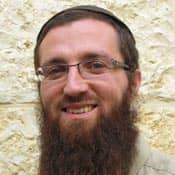One of the paradigms constantly at work in Kabbalistic thought is that everything in our physical world is a parallel of a spiritual reality. (In fact, the word KaBbaLaH itself shares its root with the word MaKBEeL, meaning parallel, hinting to the idea that through the study of Kabbalah we can come to understand our physical world as a parallel to the spiritual reality.) Our physical world can be compared to a movie screen and its spiritual source can be compared to the microfilm. While the movie projected onto the screen is physically big and impressive, when compared to the microfilm in terms of their essential levels of existence, the microfilm is much "bigger," since the microfilm is the source of the projection and the projection has no independent existence from the microfilm whatsoever. Similarly, our physical world is a projection of its spiritual source.
One application of this is that every physical thing in our world can teach us about, or be used for, spiritual pursuits.
One example is the Traveler's Prayer, which is said by Jews to God when on a journey through a non-populated area.
Perhaps one reason for the Traveler's Prayer, from a Kabbalistic perspective, is that there is an inherent danger in one's being present in a place where there is no civilization. While it may be that journeying through less populated areas is physically dangerous for various reasons—bandits, terrain, weather, etc.—when referring to the Kabbalistic take on the Traveler's Prayer we are not talking about a danger whose nature is physical. Rather, we are speaking of the spiritual root of all physical danger inherent in the difference between a civilized area and an uncivilized area.
Human Civilization
A civilized area is a place that the human race has settled and built up. An uncivilized area is a place that the human race has not settled and built up. That is to say, a civilized area is an area in which human potential is being drawn upon to bring out its full capacity, whereas an uncivilized area is an area in which human potential has not been drawn upon to bring out its full capacity.
Let's understand what we mean here when we refer to humanity. Humanity means that, while there is a side of one's self inclined toward its instincts as an animal is, there is a Godly side that can and should be placed above the instincts of the body to direct and steer the human being to conscious decision making.
The capacity to build civilizations, which requires incorporating seemingly random raw physical materials and building from them something of a higher order, is a production of the Godly side of humanity—the soul. Thus, the build-up of civilization is the human spirit manifesting itself through intellect to superimpose higher intelligence onto the physical world.
(This definition of the human being is hinted to by the name for the original human being, Adam. The word Adam is made up of the first letter of the Hebrew alphabet, which has the numerical value of one, alef, and the word for blood, dam. In Judaism, the number one can always hint to the One Infinite God. So, the name A-dam hints to a coming together of God and blood. If we break down Judaism's understanding of a person, it is exactly this—flesh and blood with a spark of Godliness, a soul.)
However, an area that has not seen the fruition of the human spirit remains more in-tune with randomness and chaos than with order. Since an uncivilized area is an area in which the human potential has not been drawn upon to settle it and build it up, it is more susceptible to the non-human concept of chaos in which random instincts run rampant without any rhyme or reason. This is what we mean by the modern phrase, "It's a jungle out there"; "out there" is an area in which conscious decision-making has taken a back seat to a purely instinctual "dog-eat-dog" world.
Personal Journey
On another level, we can say that this reality of our world reflects the reality of our lives. Each of us has certain parts of our human side that are "settled" and certain parts that our human side has not quite seemed to figure out yet. We have parts of ourselves that are more refined in which we constantly place mind over matter, spiritual over physical, and truth over falsehood. And we each have "unsettled" areas of ourselves in which we are more susceptible to "dangerous" outcomes. Perhaps when we say the Traveler's Prayer we should have in mind those instances when we find ourselves in a situation that requires us to go down one of these deserted dirt roads of self; when we take a journey beyond our civilized comfort zone and are more susceptible to the dangers of undeveloped character.
It could be that this is a reason why the Sages recommend learning Torah when traveling. The Torah is all about the developing of our selves and working to refine, actualize, and fulfill who we are. It is about the move from the randomness of the unsettled areas of our selves to the order of personal civilization.
People often think about growth as a steady climb up a ladder, step-by-step. And perhaps this is accurate. But sometimes the rungs are not that close to one another, and it is a large and frightening step that needs to be taken to make it to the next rung—a move that one does not know if he will be able to endure. It is specifically in that area of the unknown, when we are on a journey traveling through uncharted territory between the rungs of the ladder of self-development, that we hold on tight to our mapped out instruction book, the Torah, to help us make it to the next rung in the climb toward growth and actualization of self.
6/22/2011 4:00:00 AM





